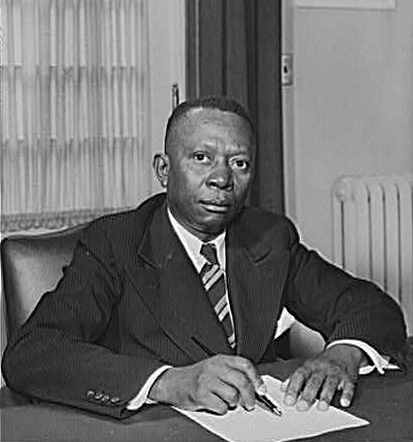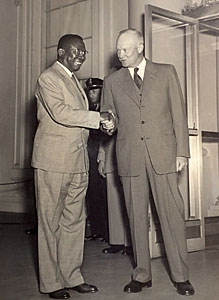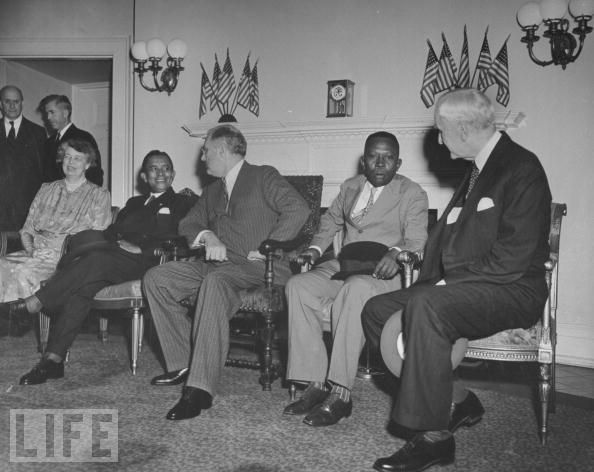<Back to Index>
- Naturalist John Ray, 1627
- Sculptor Guillaume Coustou the Elder, 1677
- 19th President of Liberia William Vacanarat Shadrach Tubman, 1895
PAGE SPONSOR



William Vacanarat Shadrach Tubman (November 29, 1895 – July 23, 1971) was a Liberian politician. He was the 19th President of Liberia from 1944 until his death in 1971.
He
is regarded as the "father of modern Liberia"; his presidency was
marked by the influx of foreign investment in his country and its
modernization. During his tenure, Liberia experienced a period of
prosperity. He also led a policy of national unity in order to reduce
the social and political differences between his fellow Americo - Liberians and the indigenous Liberians. However, further into his years in power, his way of governing became increasingly dictatorial.
Tubman was born November 29, 1895, in Harper, Liberia. William Tubman's father, the Reverend Alexander Tubman, was a stonemason, general in the Liberian army and a former Speaker of the Liberian House of Representatives, as well as a Methodist preacher.
Alexander Tubman's parents, Sylvia and William Shadrach Tubman, were
part of a group of 69 slaves freed and sent to Liberia by Emily Tubman, a philanthropic widow living in Augusta, Georgia, in 1844. Emily Tubman had been instrumental in the manumission and repatriation of African slaves in the antebellum South. They took the name Tubman after arriving in the country, naming their community Tubman Hill. His mother, Elizabeth Rebecca Barnes Tubman, came from Atlanta, Georgia. His
father required him and his other four children to attend daily family
prayer services and sleep on the floor because, he thought, beds were
too soft and therefore "degrading to character development." Tubman, the second son, went to primary school in Harper, then the Methodist Cape Palmas Seminary, and finally Harper County High School. He participated in several military operations from 1910 and 1917, rising from a private to become an officer. Tubman first planned to be a preacher and was named, at age 19, a Methodist lay pastor. After studying law under various private tutors, he passed the bar examination and became a lawyer in 1917. Subsequently, he served as a recorder in the Maryland County Monthly and Probate Court, a tax collector, teacher, and even a colonel in a militia. He also attended Freemason lodges of the Prince Hall Freemasonry sect. Having joined the True Whig Party (TWP), the dominating party of Liberia since 1878, Tubman began his career in politics. In 1923, aged 28, he was elected to the Senate of Liberia from Maryland County, holding the record as the youngest senator in the history of Liberia. Labeling
himself the "Convivial Cannibal from the Downcoast Hinterlands," he
fought for constitutional rights for the Liberian majority, its
tribespeople. Re-elected to his post in 1929, Tubman became, while a Senator, the legal adviser to then vice president Allen Yancy. He resigned from the Senate in 1931 to defend Liberia before the League of Nations amid allegations that his country was using slave labor. However, Tubman was reelected to the national legislature in 1934, though he resigned in 1937 when President Edwin Barclay appointed him associate justice of the Supreme Court of Liberia, a post he held until 1943. An
official biography speculates that Tubman's elevation to the Liberian
Supreme Court was created to remove him from actively seeking the
presidency. In December 1942, Liberia was faced with the question of the succession of President
Edwin Barclay. Six candidates then applied, including two favorites: Tubman and Foreign Minister Clarence L. Simpson. Without
much opposition from Simpson, Tubman was elected president on May 4,
1943, at the age of 48, and was inaugurated January 3, 1944. While Liberia's ally, the United States,
had already used Liberia as a military base, it was not until January
27, 1944, that Liberia renounced its neutrality and declared war on
Germany and Japan. In April 1944, Liberia signed the Declaration by United Nations. Severing
diplomatic relations with Germany and expelling all German citizens
from Liberia was a difficult decision for Liberia to make for several
reasons: (1) German merchants in Liberia ran the Liberian economy; (2)
Germany was Liberia's major trading partner; and (3), most of the
doctors in Liberia were Germans. Despite the fact that Liberia found
itself between a rock and a hard place, it agreed to expel all German
residents and declare the full might of the Liberian economy against
Nazi Germany and the Axis. In foreign policy, Tubman aligned himself with the US (in June, 1944 he and Edwin Barclay traveled to the White House to be guests of President Franklin D. Roosevelt — the first African heads of state to have this happen) while strengthening ties among fellow Africans by participating in the Asian - African Conference of 1955 and the First Conference of Independent African States in Accra, organized by Kwame Nkrumah in 1958. In 1959, Tubman organized the Second Conference of African States. In 1961, following a Pan-African conference held in Monrovia,
Tubman helped in the founding of the group of Monrovia. This
association of "moderate" African leaders worked for gradual
unification of Africa, unlike the "revolutionary" group of Casablanca. This economic success for Liberia allowed Tubman to begin its modernization: the streets of Monrovia were paved, a sanitation system was created, hospitals were built, and a literacy program was launched in 1948. Tubman built several thousand kilometers of roads and established a railway line to connect the iron mines to the coast. During this period, he transformed the Port of Monrovia into a free port. In
early 1960, Liberia began to experience its first real era of
prosperity, thanks in part to Tubman's modernization of infrastructure. Regarded as a pro-Western, stabilizing influence in West Africa, Tubman was courted by many Western politicians, notably U.S. President Lyndon B. Johnson. Meanwhile, Tubman courted Amy Ashwood Garvey, and had a long-term relationship with her. A
gunman attempted to assassinate Tubman in 1955 at the behest of his
political opponents, after which he cracked down brutally on any known
opposition politicians.
Tubman's
term is best known for the policies of National Unification and the
economic Open Door. He tried to reconcile the interests of the native
tribes with those of the Americo - Liberian elite, and increased foreign
investment in Liberia to stimulate economic growth. These policies led
to the crowning achievement of the Liberian economy during the 1950s,
when it had the second largest rate of economic growth in the world. At
his death in 1971 in a London clinic, Liberia had the largest
mercantile fleet in the world, the world's largest rubber industry, the
third largest exporter of iron ore in the world and had attracted more
than US$1 billion in foreign investment. He was succeeded as President by his long time vice president William Tolbert.
The economic prosperity of Liberia at this time would unleash political
dissent with the autocratic rule of Tubman and the True Whig Party,
leading to the overthrow of the True Whig oligarchy in 1980 by Samuel Doe. This would also destroy the economic prosperity of Liberia's golden age.
Upon Tubman's succession to the Supreme Court, infrastructure in Liberia was virtually non-existent. Tubman explained this situation by the fact that Liberia never received "benefits of colonization". To remedy this problem, he decided to set up an economic policy, called the "porte ouverte" ("open door") policy. Working
to facilitate and encourage foreign businesses to locate in Liberia,
this policy was very successful, and between 1944 and 1970, the value
of foreign investments, mainly American, increased two hundredfold. From 1950 - 1960, Liberia experienced an average annual growth of 11.5%.
